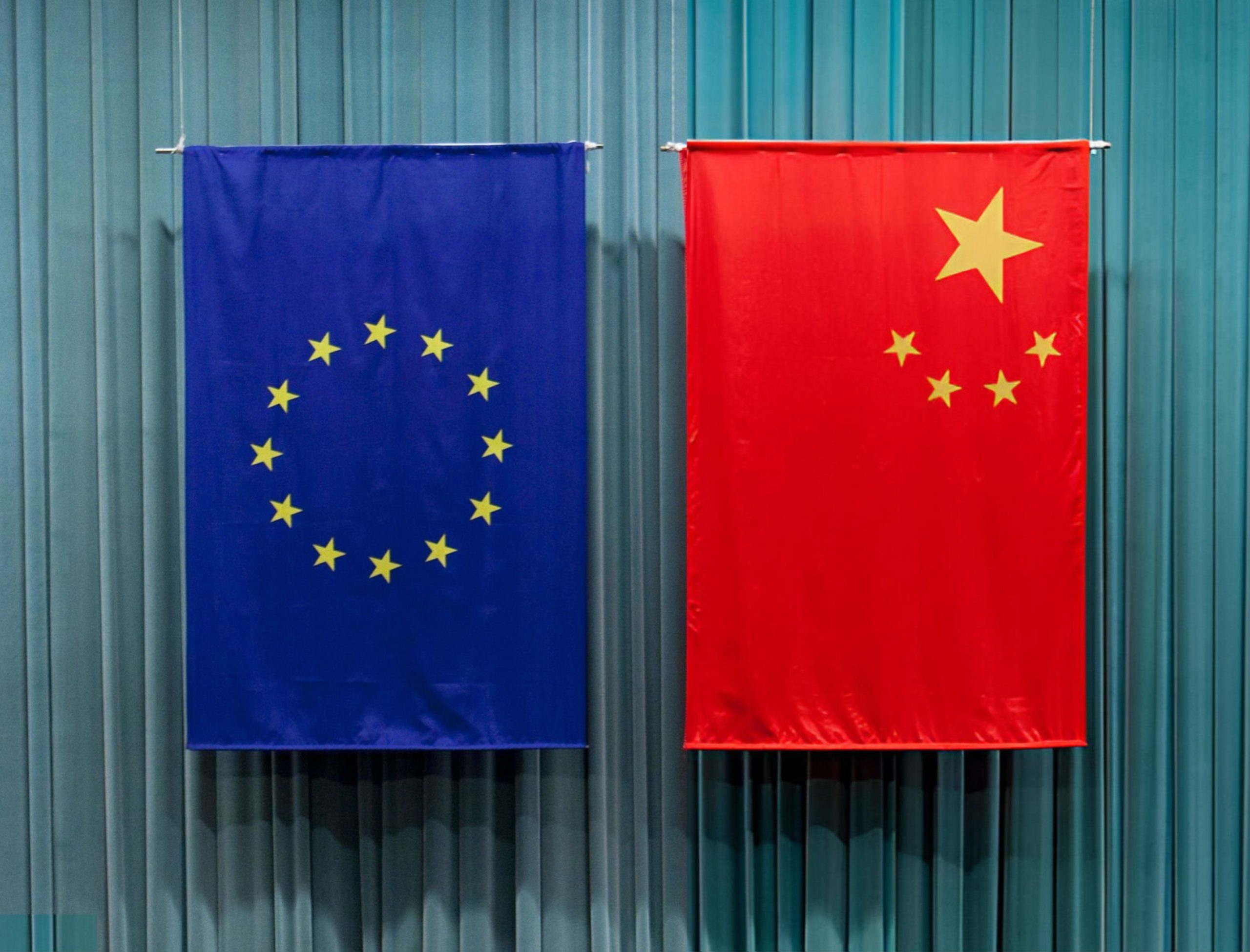

This illustration has been created by AI to use only in this article.
The trend of rising illiberalism and autocratization has not spared Europe, far from it. While the European Union’s founding treaties, signed in Maastricht in 1992, refer to the liberal values of democracy, rule of law, human rights, and the free market, the last decade has seen actors contesting this supposed universal normative system from within. In particular, since his election in 2010, Hungarian Prime Minister Viktor Orbán has attracted enormous attention due to his Eurosceptic illiberal rhetoric. Now fifteen years later, Orbán and his Hungarian far-right party Fidesz remain in power domestically and have gained a reputation for being a leading disrupting force within the EU.
Indeed, Orbán’s illiberal politics have not only affected the rights and freedoms of Hungarians, but have also taken a central role in the development of a transnational illiberal European political movement, uniting populist far-right forces across the continent. While illiberalism, autocracy, and far-right nationalist populism are not unique to Orbán or his so-called political doctrine of ‘Orbanism’, the Hungarian example showcases the ways in which effective mobilization of illiberal rhetoric and transnational ties can promote the erosion of core liberal values at a European and global level.
Orbán’s politics should thus not only be viewed within his domestic Hungarian context, but also have to be situated in view of transnational political networks and alliances. While events such as the recent banning of the 2025 Budapest Pride have sparked widespread condemnation across EU member states and institutions, the EU context has also benefitted Orbán and his allies, allowing them to mobilize around Europe-wide populist grievances. It is from this multi-level perspective, taking into account domestic, European, and international dimensions, that this article analyses Viktor Orbán’s political influence.
Democracy Hollowed Out
To understand Viktor Orbán’s political vision and his impact on the current European landscape, it is perhaps most useful to go back to his 2014 speech in Tusnádfürdő, Romania. Orbán opens by presenting the 2008 financial crisis as a pivotal moment in global history, set to change the world order. He views the crisis as the fundamental failure of Western liberalism, and evidence that Eastern illiberal states can rise within the world order without adopting Western liberal values. Orbán goes on to lament Western states’ focus on accruing revenue for mega-corporations at the expense of the domestic working class, Western politicians’ praise of multiculturalism and pro-immigration stances, and Hungary’s lack of economic standing within the EU.
His conclusion to these problems? The illiberal democratic state. Orbán’s Tusnádfürdő speech reveals a few things central to his worldview. To begin with, he views liberalism, that is, the school of thought valuing the inalienable rights of the individual, democratic representation, and the equality of all citizens before the law, as inherently Western. As such, Orbán positions liberalism as diametrically opposed to supposedly authentic Eastern values, and presents it as a doctrine imposed upon Hungary by Western powers. This dichotomy between the ‘Western’ and the ‘Eastern’, which is essentialized without further critical engagement, is at the core of Orbán’s ideological standpoint: It serves as the rationale to promote a return to authentic Eastern illiberalism and a rejection of the alien and hegemonic Western liberalism.
is a graduate of the MA European Studies: Transnational and Global Perspective from KU Leuven. She is currently pursuing a second MA in Middle Eastern Studies at Leiden University, where she further developed her passion for Euro-Mediterranean relations, conflict and security studies, and migration diplomacy.
The trend of rising illiberalism and autocratization has not spared Europe, far from it. While the European Union’s founding treaties, signed in Maastricht in 1992, refer to the liberal values of democracy, rule of law, human rights, and the free market, the last decade has seen actors contesting this supposed universal normative system from within. In particular, since his election in 2010, Hungarian Prime Minister Viktor Orbán has attracted enormous attention due to his Eurosceptic illiberal rhetoric. Now fifteen years later, Orbán and his Hungarian far-right party Fidesz remain in power domestically and have gained a reputation for being a leading disrupting force within the EU.
Indeed, Orbán’s illiberal politics have not only affected the rights and freedoms of Hungarians, but have also taken a central role in the development of a transnational illiberal European political movement, uniting populist far-right forces across the continent. While illiberalism, autocracy, and far-right nationalist populism are not unique to Orbán or his so-called political doctrine of ‘Orbanism’, the Hungarian example showcases the ways in which effective mobilization of illiberal rhetoric and transnational ties can promote the erosion of core liberal values at a European and global level.
Orbán’s politics should thus not only be viewed within his domestic Hungarian context, but also have to be situated in view of transnational political networks and alliances. While events such as the recent banning of the 2025 Budapest Pride have sparked widespread condemnation across EU member states and institutions, the EU context has also benefitted Orbán and his allies, allowing them to mobilize around Europe-wide populist grievances. It is from this multi-level perspective, taking into account domestic, European, and international dimensions, that this article analyses Viktor Orbán’s political influence.
Democracy Hollowed Out
To understand Viktor Orbán’s political vision and his impact on the current European landscape, it is perhaps most useful to go back to his 2014 speech in Tusnádfürdő, Romania. Orbán opens by presenting the 2008 financial crisis as a pivotal moment in global history, set to change the world order. He views the crisis as the fundamental failure of Western liberalism, and evidence that Eastern illiberal states can rise within the world order without adopting Western liberal values. Orbán goes on to lament Western states’ focus on accruing revenue for mega-corporations at the expense of the domestic working class, Western politicians’ praise of multiculturalism and pro-immigration stances, and Hungary’s lack of economic standing within the EU.
His conclusion to these problems? The illiberal democratic state. Orbán’s Tusnádfürdő speech reveals a few things central to his worldview. To begin with, he views liberalism, that is, the school of thought valuing the inalienable rights of the individual, democratic representation, and the equality of all citizens before the law, as inherently Western. As such, Orbán positions liberalism as diametrically opposed to supposedly authentic Eastern values, and presents it as a doctrine imposed upon Hungary by Western powers. This dichotomy between the ‘Western’ and the ‘Eastern’, which is essentialized without further critical engagement, is at the core of Orbán’s ideological standpoint: It serves as the rationale to promote a return to authentic Eastern illiberalism and a rejection of the alien and hegemonic Western liberalism.
is a graduate of the MA European Studies: Transnational and Global Perspective from KU Leuven. She is currently pursuing a second MA in Middle Eastern Studies at Leiden University, where she further developed her passion for Euro-Mediterranean relations, conflict and security studies, and migration diplomacy.
Orbán’s idea of the illiberal democratic state is further underpinned by a populist anti-elite view claiming to promote the interests of the working people. Orbán paints the ills of the 2008 financial collapse on Western elites’ focus on the profit of the few over the needs of the many, and on their willingness to support foreign immigrants over nationals. This serves as justification for Orbán’s skepticism towards the liberal free-market economy and the welfare state in favor of a supposedly working-class-based economy. The examples of successful illiberal Eastern economies Orbán presents, such as Singapore, India, and China, suggest a belief in the economic success of states that broke free-market principles in favor of selective state interference in the economy.
This underpins Orbán’s belief in a strong state that is able to provide for its national constituency over a liberal state minimally engaging in a free market. Furthermore, Orbán’s belief in the privileging of the domestic working class leads to his rejection of multiculturalism and tolerance. Orbán views the acceptance of a diversity of cultures, religious beliefs, and gender and sexual identity as a threat to the Hungarian nation. He positions tolerance as a foreign norm, and calls for a return to traditional Hungarian values, such as Christian beliefs, traditional gender roles, and cultural homogeneity. A return to these traditional values is presented as a way to preserve the true essence of the Hungarian nation and fight foreign-imposed multiculturalism.
With that, Orbanism advocates for a highly nationalist worldview, based on an ethnic understanding of the Hungarian nation. As opposed to civic nationalism, which understands the nation as sharing a set of values and civic rights, ethnic nationalism defines the nation through a common ancestry, shared language, religion, and cultural background. While ethno-nationalist components exist in many national imaginaries, Orbán conceives Hungarian nationalism through a purely ethnic lens and completely rejects civic nationalism and those perceived to not belong to the Hungarian nation. This has led to a highly hostile anti-immigration rhetoric within Orbán’s political discourse, as well as a targeting of ethnic and religious minorities, which are seen as feeding off the state at the expense of the Hungarian populace.
Despite proclaiming his political movement as democratic, Orbanism has also acquired contradictory autocratic tendencies. This has led some to describe Orbanism as an inherently autocratic movement, fundamentally at odds with a democratic political vision. ‘Illiberal democracy’ could thus be considered an oxymoron, as the foundations of a healthy democracy arguably rely on liberal foundations. A polity that places ethnic Hungarians above other constituents, for instance, can be viewed to compromise the vision of equal citizenship required for a true democracy.
Orbán’s idea of the illiberal democratic state is further underpinned by a populist anti-elite view claiming to promote the interests of the working people. Orbán paints the ills of the 2008 financial collapse on Western elites’ focus on the profit of the few over the needs of the many, and on their willingness to support foreign immigrants over nationals. This serves as justification for Orbán’s skepticism towards the liberal free-market economy and the welfare state in favor of a supposedly working-class-based economy. The examples of successful illiberal Eastern economies Orbán presents, such as Singapore, India, and China, suggest a belief in the economic success of states that broke free-market principles in favor of selective state interference in the economy.
This underpins Orbán’s belief in a strong state that is able to provide for its national constituency over a liberal state minimally engaging in a free market. Furthermore, Orbán’s belief in the privileging of the domestic working class leads to his rejection of multiculturalism and tolerance. Orbán views the acceptance of a diversity of cultures, religious beliefs, and gender and sexual identity as a threat to the Hungarian nation. He positions tolerance as a foreign norm, and calls for a return to traditional Hungarian values, such as Christian beliefs, traditional gender roles, and cultural homogeneity. A return to these traditional values is presented as a way to preserve the true essence of the Hungarian nation and fight foreign-imposed multiculturalism.
With that, Orbanism advocates for a highly nationalist worldview, based on an ethnic understanding of the Hungarian nation. As opposed to civic nationalism, which understands the nation as sharing a set of values and civic rights, ethnic nationalism defines the nation through a common ancestry, shared language, religion, and cultural background. While ethno-nationalist components exist in many national imaginaries, Orbán conceives Hungarian nationalism through a purely ethnic lens and completely rejects civic nationalism and those perceived to not belong to the Hungarian nation. This has led to a highly hostile anti-immigration rhetoric within Orbán’s political discourse, as well as a targeting of ethnic and religious minorities, which are seen as feeding off the state at the expense of the Hungarian populace.
Despite proclaiming his political movement as democratic, Orbanism has also acquired contradictory autocratic tendencies. This has led some to describe Orbanism as an inherently autocratic movement, fundamentally at odds with a democratic political vision. ‘Illiberal democracy’ could thus be considered an oxymoron, as the foundations of a healthy democracy arguably rely on liberal foundations. A polity that places ethnic Hungarians above other constituents, for instance, can be viewed to compromise the vision of equal citizenship required for a true democracy.
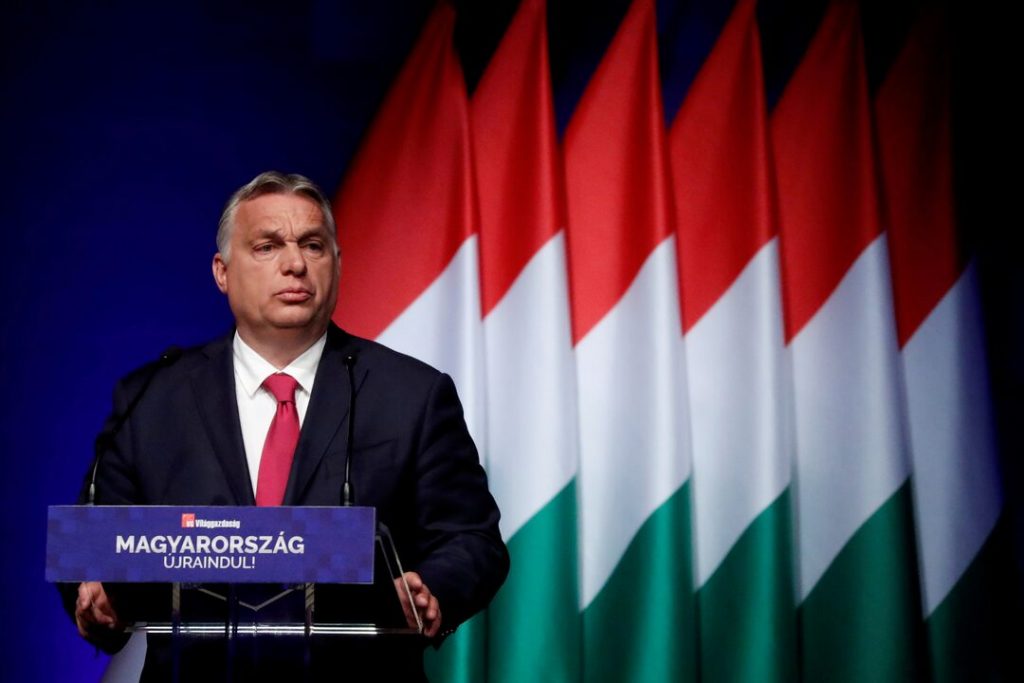
In addition, Orbanism functionally hollows out checks and balances, institutional accountability, and the independence of the judiciary fundamental to upholding a democratic political system. This tension within the concept of ‘illiberal democracy’ thus raises the fundamental question: Is Orbán not simply arguing in favor of autocracy through euphemistic, palatable phrasing? Some might find it more appropriate to call Orbán’s Hungary an electoral autocracy: a political system that maintains a pale semblance of democracy through regular elections allowing opposition, but that is heavily skewed in favor of the incumbent and is designed to erode citizens’ rights.
An Autocrat Among Democrats
Nevertheless, and perhaps most contradictorily, Orbán’s 2014 speech does not present his vision of the illiberal democratic state as fundamentally incompatible with membership in the EU. While Orbán anticipates conflict and pushback, he presents EU membership as feasible, under the condition that Hungary be able to regain its sovereignty and rebalance the financial relations between EU institutions and its member states. While Orbán is widely considered a Eurosceptic for his questioning of the value of supranational European governance and his advocacy for national sovereignty, he has to this day yet to make a serious push for Hungarian secession.
Instead, Orbán has privileged contesting the EU and re-writing the rules from within. This contestation began with domestic reforms, which posed a challenge to EU liberal values and legal standards meant to underpin a common foundation for all member states. In 2011, shortly after gaining power, Orbán and his political party Fidesz amended the Hungarian constitution under the presumption of breaking away from Hungary’s communist past and protecting Hungarian national assets. In reality, the new constitution significantly reduced the influence and independence of the judiciary and extended the power of the legislative and executive branches.
Particularly, the new constitution allowed for the introduction of cardinal laws that gave the Parliament (at the time under Fidesz majority rule) the power to appoint and remove judges from the Constitutional Court. In the following years, reforms further eroded democratic freedoms. Political opposition was curtailed through financial and disciplinary sanctions, smear campaigns, and the defunding of civil society organizations and NGOs. Moreover, the Hungarian Media Council was co-opted by Fidesz, leading to heavy censorship of independent media and press. Similarly, Orbán’s government diminished universities’ ability to conduct independent research through the establishment of private trustee boards including government-appointed members.
Last, Fidesz heavily campaigned on the ideal of a traditional family and gender roles, truncating LGBTQ+ people’s access to marriage equality and adoption, and eroding women’s access to reproductive healthcare. Economically, Orbán challenged the EU’s liberal free market and fiscal policies. While Hungary had experienced significant economic growth after reforming into a market economy in the late 1990s and joining the EU in 2004, the 2008 financial crisis led to a sharp drop in GDP and increased financial dependence on the EU, the International Monetary Fund, and the World Bank. This instilled a negative connotation towards transnational liberal private ownership within Hungary’s domestic context.
Orbanism functionally hollows out checks and balances, institutional accountability, and the independence of the judiciary.
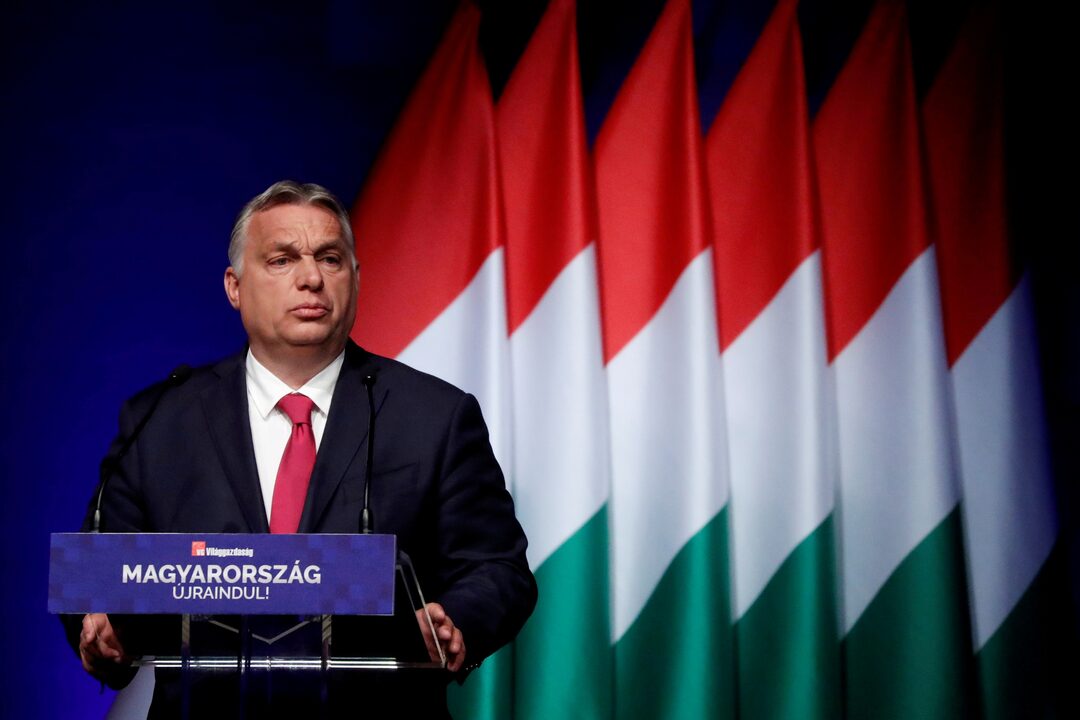
As such, Orbán preached the reclaiming of Hungarian ownership over key economic sectors, most crucially energy, banking, and media, in order to curb foreign economic influence. Similarly, foreign direct investments (FDI), which had been crucial to Hungary’s economic growth in the 90s, were now seen as a national threat benefitting foreign corporate elites, leading to a heavy increase in taxation of foreign businesses. Furthermore, economic reforms attacked the European welfare state model and dramatically cut unemployment benefits and pension schemes, which Orbán argued rewarded migrants and lazy non-working people.
Instead, Orbán aimed to build a working-class-based economy, and set out to curb working-class unemployment through work programs increasing employment in the public sector. These economic reforms promoted cronyism and corruption within Hungary’s national apparatus, and curtailed the freedom of the market. As a result of these legal, political, and economic reforms, Hungary has dramatically fallen off democratic standards. Over the last decade and a half, Freedom House reported a democracy score of 43/100 in 2024, classifying Hungary’s political regime as transitional or hybrid. Hungary is thus generally described as the first EU country to have breached the classification threshold from a democracy into a partial autocracy, and one of the nations with the greatest democratic backsliding worldwide in the last decade. Despite this dramatic shift, Hungary remains a member of the EU, raising questions regarding the future of the European project and the effects on other member states.
The International Strongman Club
However, Orbán’s promotion of illiberalism goes beyond domestic reforms. Indeed, transnational ties with like-minded far-right populists have been at the core of his political strategy. Within the EU, Fidesz has led the vanguard of Europe’s far-right through the creation of the new parliament group Patriots for Europe following the 2024 European Parliament (EP) elections. This new group encompasses European far-right parties such as Belgium’s Vlaams Belang, France’s Rassemblement National, Spain’s Vox, and the Netherlands’ Partij voor de Vrijheid. The creation of this new alliance, which was accompanied by a significant increase in parliamentary seats for European right and far-right parties and a loss of seats for center-left parties, has been at the forefront of a push for a nationalist, illiberal, and Eurosceptic sovereigntist agenda.
Far-right political discourses surrounding gender and LGBTQ+ identities, immigration, and religious and cultural diversity have crept into the EP, lending a wider platform to illiberal and autocratic ideas at the center of European democracy. In addition, Patriots for Europe has taken an active stance in countering the center-right European People’s Party (EPP), the dominant and pro-European party within the EP, such as pushing a motion of censure against European Commission President Ursula von der Leyen in July 2025. The building of a European far-right coalition has gone hand-in-hand with the building of international illiberal ties, directly challenging the liberal international order.
While most European states took a strong stance against Russia in the aftermath of the 2022 invasion of Ukraine, Orbán stands out in his refusal to cut ties with Moscow. In July 2024, as part of Hungary’s duties as the rotating presidency of the Council of the EU, Orbán met with Russian President Vladimir Putin despite heavy condemnation from Brussels. This seemingly friendly relationship with a leader that is otherwise perceived as an existential threat by most of the EU stems from like-minded beliefs in a return to traditional Eastern values and a rejection of Western liberal hegemony. With the election of Argentina’s far-right President Javier Milei in 2023 and the re-election of Donald Trump in the United States in 2024, Orbán’s international circle of like-minded far-right populists only threatens to grow.
Benjamin Netanyahu, the Prime Minister of Israel and member of the far-right Likud party, has also been a key international ally in Orbán’s transnational illiberal network. In the aftermath of the October 7th attack by Hamas, Orbán staunchly stood at the side of Israel, on the grounds of defending Jewish communities. This stands in sharp contrast to Orbán and Fidesz’s antisemitic political rhetoric domestically, which excludes Jewish communities from the Hungarian ethno-national ideal and diminishes Hungary’s role in the Holocaust.
Netanyahu has only welcomed Orbán’s embrace, taking advantage of his illiberal rhetoric to pursue his own political gain and gather support for Israel’s war on Gaza. Despite Netanyahu being subject to an arrest warrant issued by the International Criminal Court (ICC) for war crimes and crimes against humanity, Orbán invited Netanyahu to Hungary in April 2025, in direct violation of the Rome Statute. Subsequently, Orbán withdrew from the Rome Statute, invalidating the ICC as a pillar of international law and thereby undermining a core institution upholding the international liberal order.
The Price of Appeasement
Orbán’s contestation of the liberal order occupies an interesting place within the European political theatre, engendering both contestation and acceptance. Starting from 2011, key EU institutions have directly challenged Orbán and presented him as a threat to European values. Viviane Reding, the European Commissioner for Justice, Fundamental Rights and Citizenship at the time, denounced Orbán for deliberately eroding democracy and the rule of law domestically. Similarly, the Venice Commission under the Council of Europe raised worries about constitutional changes, in particular regarding the independence of the judiciary.
In 2022, more than €6 billion in EU recovery and cohesion funds for Hungary and Poland were frozen in a push from the European Commission to combat the states’ erosion of the rule of law and stifling of civil society. While both Hungary and Poland contested the sanctions, presenting a case to the Court of Justice arguing that the Commission and Council were abusing their power and violating the European Treaties, they were eventually dismissed. In addition to the financial mechanisms invoked by the Commission, the European Parliament has repeatedly condemned the Hungarian government in its declarations for violating fundamental European values.
While mostly discursive, these declarations contributed to the positioning of Orbán as a challenger of European democracy. Recent political developments further exacerbated tension between Orbán and the European mainstream. While European member states have been united in their condemnation of Russia’s illegal invasion of Ukraine and in advocating for sanctions, Orbán’s Hungary has proven to be a thorn in their side. Within the European Council, Hungary has repeatedly refused to vote on new sanction packages, effectively allowing for their approval but without active support.
In addition, Orbanism functionally hollows out checks and balances, institutional accountability, and the independence of the judiciary fundamental to upholding a democratic political system. This tension within the concept of ‘illiberal democracy’ thus raises the fundamental question: Is Orbán not simply arguing in favor of autocracy through euphemistic, palatable phrasing? Some might find it more appropriate to call Orbán’s Hungary an electoral autocracy: a political system that maintains a pale semblance of democracy through regular elections allowing opposition, but that is heavily skewed in favor of the incumbent and is designed to erode citizens’ rights.
An Autocrat Among Democrats
Nevertheless, and perhaps most contradictorily, Orbán’s 2014 speech does not present his vision of the illiberal democratic state as fundamentally incompatible with membership in the EU. While Orbán anticipates conflict and pushback, he presents EU membership as feasible, under the condition that Hungary be able to regain its sovereignty and rebalance the financial relations between EU institutions and its member states. While Orbán is widely considered a Eurosceptic for his questioning of the value of supranational European governance and his advocacy for national sovereignty, he has to this day yet to make a serious push for Hungarian secession.
Instead, Orbán has privileged contesting the EU and re-writing the rules from within. This contestation began with domestic reforms, which posed a challenge to EU liberal values and legal standards meant to underpin a common foundation for all member states. In 2011, shortly after gaining power, Orbán and his political party Fidesz amended the Hungarian constitution under the presumption of breaking away from Hungary’s communist past and protecting Hungarian national assets. In reality, the new constitution significantly reduced the influence and independence of the judiciary and extended the power of the legislative and executive branches.
Particularly, the new constitution allowed for the introduction of cardinal laws that gave the Parliament (at the time under Fidesz majority rule) the power to appoint and remove judges from the Constitutional Court. In the following years, reforms further eroded democratic freedoms. Political opposition was curtailed through financial and disciplinary sanctions, smear campaigns, and the defunding of civil society organizations and NGOs. Moreover, the Hungarian Media Council was co-opted by Fidesz, leading to heavy censorship of independent media and press. Similarly, Orbán’s government diminished universities’ ability to conduct independent research through the establishment of private trustee boards including government-appointed members.
Last, Fidesz heavily campaigned on the ideal of a traditional family and gender roles, truncating LGBTQ+ people’s access to marriage equality and adoption, and eroding women’s access to reproductive healthcare. Economically, Orbán challenged the EU’s liberal free market and fiscal policies. While Hungary had experienced significant economic growth after reforming into a market economy in the late 1990s and joining the EU in 2004, the 2008 financial crisis led to a sharp drop in GDP and increased financial dependence on the EU, the International Monetary Fund, and the World Bank. This instilled a negative connotation towards transnational liberal private ownership within Hungary’s domestic context.
As such, Orbán preached the reclaiming of Hungarian ownership over key economic sectors, most crucially energy, banking, and media, in order to curb foreign economic influence. Similarly, foreign direct investments (FDI), which had been crucial to
Hungary’s economic growth in the 90s, were now seen as a national threat benefitting foreign corporate elites, leading to a heavy increase in taxation of foreign businesses. Furthermore, economic reforms attacked the European welfare state model and dramatically cut unemployment benefits and pension schemes, which Orbán argued rewarded migrants and lazy non-working people.
Instead, Orbán aimed to build a working-class-based economy, and set out to curb working-class unemployment through work programs increasing employment in the public sector. These economic reforms promoted cronyism and corruption within Hungary’s national apparatus, and curtailed the freedom of the market. As a result of these legal, political, and economic reforms, Hungary has dramatically fallen off democratic standards. Over the last decade and a half, Freedom House reported a democracy score of 43/100 in 2024, classifying Hungary’s political regime as transitional or hybrid. Hungary is thus generally described as the first EU country to have breached the classification threshold from a democracy into a partial autocracy, and one of the nations with the greatest democratic backsliding worldwide in the last decade. Despite this dramatic shift, Hungary remains a member of the EU, raising questions regarding the future of the European project and the effects on other member states.
The International Strongman Club
However, Orbán’s promotion of illiberalism goes beyond domestic reforms. Indeed, transnational ties with like-minded far-right populists have been at the core of his political strategy. Within the EU, Fidesz has led the vanguard of Europe’s far-right through the creation of the new parliament group Patriots for Europe following the 2024 European Parliament (EP) elections. This new group encompasses European far-right parties such as Belgium’s Vlaams Belang, France’s Rassemblement National, Spain’s Vox, and the Netherlands’ Partij voor de Vrijheid. The creation of this new alliance, which was accompanied by a significant increase in parliamentary seats for European right and far-right parties and a loss of seats for center-left parties, has been at the forefront of a push for a nationalist, illiberal, and Eurosceptic sovereigntist agenda.
Far-right political discourses surrounding gender and LGBTQ+ identities, immigration, and religious and cultural diversity have crept into the EP, lending a wider platform to illiberal and autocratic ideas at the center of European democracy. In addition, Patriots for Europe has taken an active stance in countering the center-right European People’s Party (EPP), the dominant and pro-European party within the EP, such as pushing a motion of censure against European Commission President Ursula von der Leyen in July 2025. The building of a European far-right coalition has gone hand-in-hand with the building of international illiberal ties, directly challenging the liberal international order.
While most European states took a strong stance against Russia in the aftermath of the 2022 invasion of Ukraine, Orbán stands out in his refusal to cut ties with Moscow. In July 2024, as part of Hungary’s duties as the rotating presidency of the Council of the EU, Orbán met with Russian President Vladimir Putin despite heavy condemnation from Brussels. This seemingly friendly relationship with a leader that is otherwise perceived as an existential threat by most of the EU stems from like-minded beliefs in a return to traditional Eastern values and a rejection of Western liberal hegemony. With the election of Argentina’s far-right President Javier Milei in 2023 and the re-election of Donald Trump in the United States in 2024, Orbán’s international circle of like-minded far-right populists only threatens to grow.
Benjamin Netanyahu, the Prime Minister of Israel and member of the far-right Likud party, has also been a key international ally in Orbán’s transnational illiberal network. In the aftermath of the October 7th attack by Hamas, Orbán staunchly stood at the side of Israel, on the grounds of defending Jewish communities. This stands in sharp contrast to Orbán and Fidesz’s antisemitic political rhetoric domestically, which excludes Jewish communities from the Hungarian ethno-national ideal and diminishes Hungary’s role in the Holocaust.
Netanyahu has only welcomed Orbán’s embrace, taking advantage of his illiberal rhetoric to pursue his own political gain and gather support for Israel’s war on Gaza. Despite Netanyahu being subject to an arrest warrant issued by the International Criminal Court (ICC) for war crimes and crimes against humanity, Orbán invited Netanyahu to Hungary in April 2025, in direct violation of the Rome Statute. Subsequently, Orbán withdrew from the Rome Statute, invalidating the ICC as a pillar of international law and thereby undermining a core institution upholding the international liberal order.
The Price of Appeasement
Orbán’s contestation of the liberal order occupies an interesting place within the European political theatre, engendering both contestation and acceptance. Starting from 2011, key EU institutions have directly challenged Orbán and presented him as a threat to European values. Viviane Reding, the European Commissioner for Justice, Fundamental Rights and Citizenship at the time, denounced Orbán for deliberately eroding democracy and the rule of law domestically. Similarly, the Venice Commission under the Council of Europe raised worries about constitutional changes, in particular regarding the independence of the judiciary.
In 2022, more than €6 billion in EU recovery and cohesion funds for Hungary and Poland were frozen in a push from the European Commission to combat the states’ erosion of the rule of law and stifling of civil society. While both Hungary and Poland contested the sanctions, presenting a case to the Court of Justice arguing that the Commission and Council were abusing their power and violating the European Treaties, they were eventually dismissed. In addition to the financial mechanisms invoked by the Commission, the European Parliament has repeatedly condemned the Hungarian government in its declarations for violating fundamental European values.
While mostly discursive, these declarations contributed to the positioning of Orbán as a challenger of European democracy. Recent political developments further exacerbated tension between Orbán and the European mainstream. While European member states have been united in their condemnation of Russia’s illegal invasion of Ukraine and in advocating for sanctions, Orbán’s Hungary has proven to be a thorn in their side. Within the European Council, Hungary has repeatedly refused to vote on new sanction packages, effectively allowing for their approval but without active support.
Moreover, in June 2025, the annual Budapest Pride Parade, aimed at celebrating LGBTQ+ identities as well as equality and inclusion, was cancelled by the Hungarian Parliament under the presumption of it presenting a threat to children.
This decision is part of a longer list of Orbán’s curtailing of LGBTQ+ rights, which he views as Western-imported ideals. Nevertheless, the move to ban the Budapest Pride Parade was challenged domestically, with multiple grassroots protests erupting and Budapest’s mayor re-instating the event. Ursula von der Leyen, the current President of the European Commission, has expressed her support for the Budapest Pride and the inclusion of LGBTQ+ identities, and condemned Orbán’s ban.
In addition, the Budapest Pride Parade was attended by many foreign members of the European Parliament (MEPs) and activists who showcased support for the Pride-goers challenging Orbán’s ban, leading to an estimated record attendance of 200,000 people. Nevertheless, despite seemingly widespread contestation, the illiberal ideals of Orbán and his allies have also partially been accepted by the European mainstream in an attempt to quell the appeal of far-right parties. With regards to migration policy, the EPP has adopted a rhetoric not so dissimilar to that of Orbán, aiming to curb immigration from outside of Europe and reinforcing border militarization.
The 2021 New Migration and Asylum Pact, aiming to fight the rise of the European far-right, was adopted as a way to show that the EU could act on the ‘problem’ of migration. Mainstream EU actors thus often aim to fight the European far-right through the adoption of similar rhetoric and policies, showcasing a worrying willingness to compromise human rights and international law and accommodate illiberal positions. Furthermore, mainstream EU actors have showcased similar undermining of international law with regards to the Israeli government’s crimes in Gaza and ICC arrest warrants against Israeli leaders.
On October 13, 2023, von der Leyen and President of the European Parliament Roberta Metsola visited Israel and voiced the EU’s complete support for Israeli President Herzog, despite the Israeli government declaring a complete siege on Gaza including fuel, electricity, and water in direct violation of international humanitarian law. Furthermore, European leaders such as French President Emmanuel Macron have allowed Netanyahu to fly within their airspace despite their obligations under the Rome Statute. These actions indicate a wider EU turn against international law and its institutions not limited to far-right parties, and risk undermining the very international liberal order Europe contributed to build.
Europe’s Illiberal Drift
Orbán is not the only illiberal force within the EU, nor did he pioneer many of the illiberal trends pushing Europe towards a rightward shift. Nevertheless, his long-standing leadership of Hungary and contestation of liberal values within the context of the EU has facilitated the increasing normalization of illiberal beliefs. This normalization of illiberalism poses existential questions to the European project, and whether liberal values will remain at the center of it. Despite this rightward illiberal shift, there remain actors willing to defend liberal European values and act against their undermining from both far-right and mainstream European actors. The EU mainstream thus needs to critically respond to Orbán’s illiberal challenge, as appeasement only emboldens it.
Key EU institutions have directly challenged Orbán and presented him as a threat to European values.
Moreover, in June 2025, the annual Budapest Pride Parade, aimed at celebrating LGBTQ+ identities as well as equality and inclusion, was cancelled by the Hungarian Parliament under the presumption of it presenting a threat to children. This decision is part of a longer list of Orbán’s curtailing of LGBTQ+ rights, which he views as Western-imported ideals. Nevertheless, the move to ban the Budapest Pride Parade was challenged domestically, with multiple grassroots protests erupting and Budapest’s mayor re-instating the event. Ursula von der Leyen, the current President of the European Commission, has expressed her support for the Budapest Pride and the inclusion of LGBTQ+ identities, and condemned Orbán’s ban.
In addition, the Budapest Pride Parade was attended by many foreign members of the European Parliament (MEPs) and activists who showcased support for the Pride-goers challenging Orbán’s ban, leading to an estimated record attendance of 200,000 people. Nevertheless, despite seemingly widespread contestation, the illiberal ideals of Orbán and his allies have also partially been accepted by the European mainstream in an attempt to quell the appeal of far-right parties. With regards to migration policy, the EPP has adopted a rhetoric not so dissimilar to that of Orbán, aiming to curb immigration from outside of Europe and reinforcing border militarization.
The 2021 New Migration and Asylum Pact, aiming to fight the rise of the European far-right, was adopted as a way to show that the EU could act on the ‘problem’ of migration. Mainstream EU actors thus often aim to fight the European far-right through the adoption of similar rhetoric and policies, showcasing a worrying willingness to compromise human rights and international law and accommodate illiberal positions. Furthermore, mainstream EU actors have showcased similar undermining of international law with regards to the Israeli government’s crimes in Gaza and ICC arrest warrants against Israeli leaders.
On October 13, 2023, von der Leyen and President of the European Parliament Roberta Metsola visited Israel and voiced the EU’s complete support for Israeli President Herzog, despite the Israeli government declaring a complete siege on Gaza including fuel, electricity, and water in direct violation of international humanitarian law. Furthermore, European leaders such as French President Emmanuel Macron have allowed Netanyahu to fly within their airspace despite their obligations under the Rome Statute. These actions indicate a wider EU turn against international law and its institutions not limited to far-right parties, and risk undermining the very international liberal order Europe contributed to build.
Europe’s Illiberal Drift
Orbán is not the only illiberal force within the EU, nor did he pioneer many of the illiberal trends pushing Europe towards a rightward shift. Nevertheless, his long-standing leadership of Hungary and contestation of liberal values within the context of the EU has facilitated the increasing normalization of illiberal beliefs. This normalization of illiberalism poses existential questions to the European project, and whether liberal values will remain at the center of it. Despite this rightward illiberal shift, there remain actors willing to defend liberal European values and act against their undermining from both far-right and mainstream European actors. The EU mainstream thus needs to critically respond to Orbán’s illiberal challenge, as appeasement only emboldens it.
Recommended
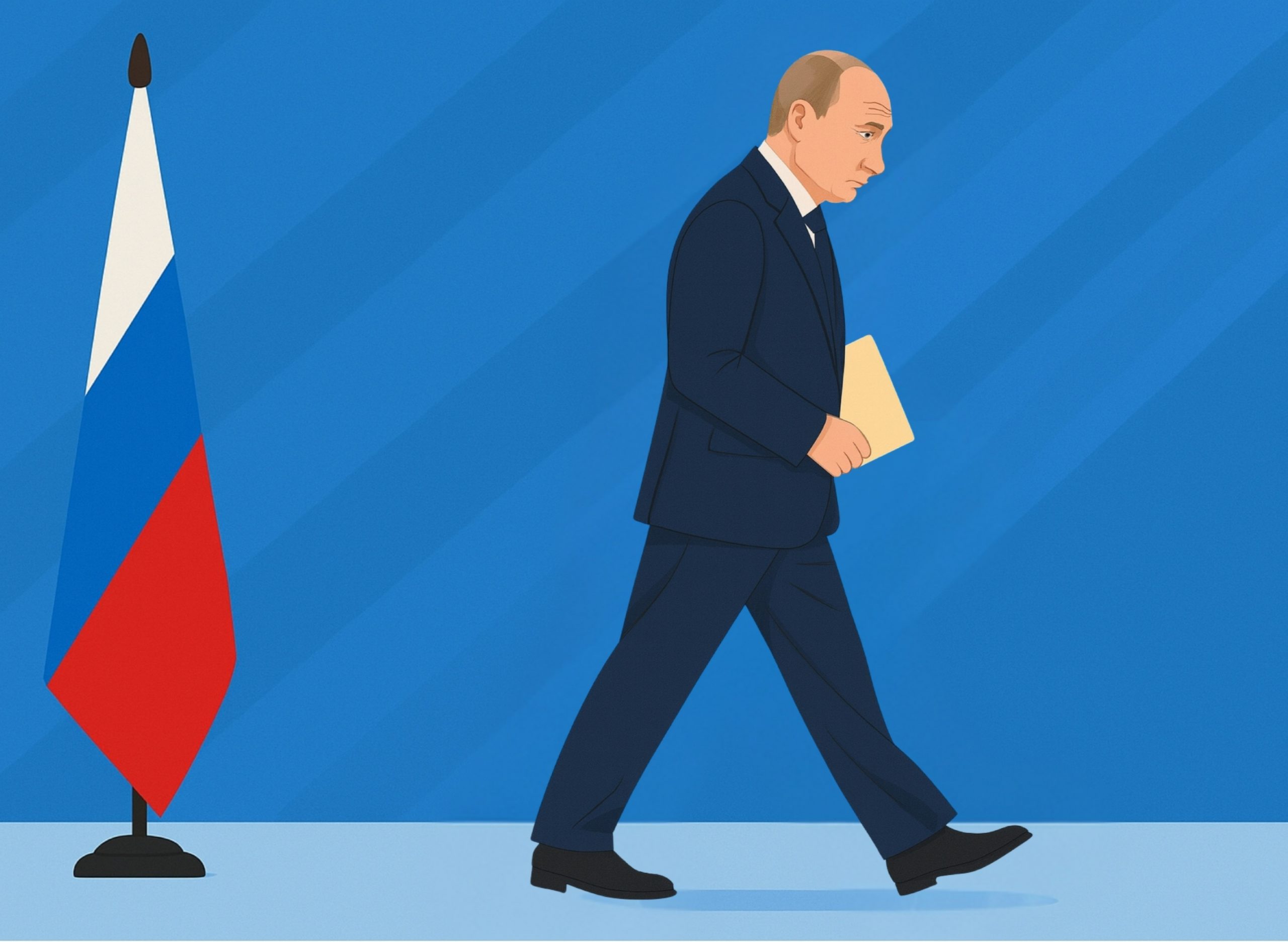
How One Man Became Russia
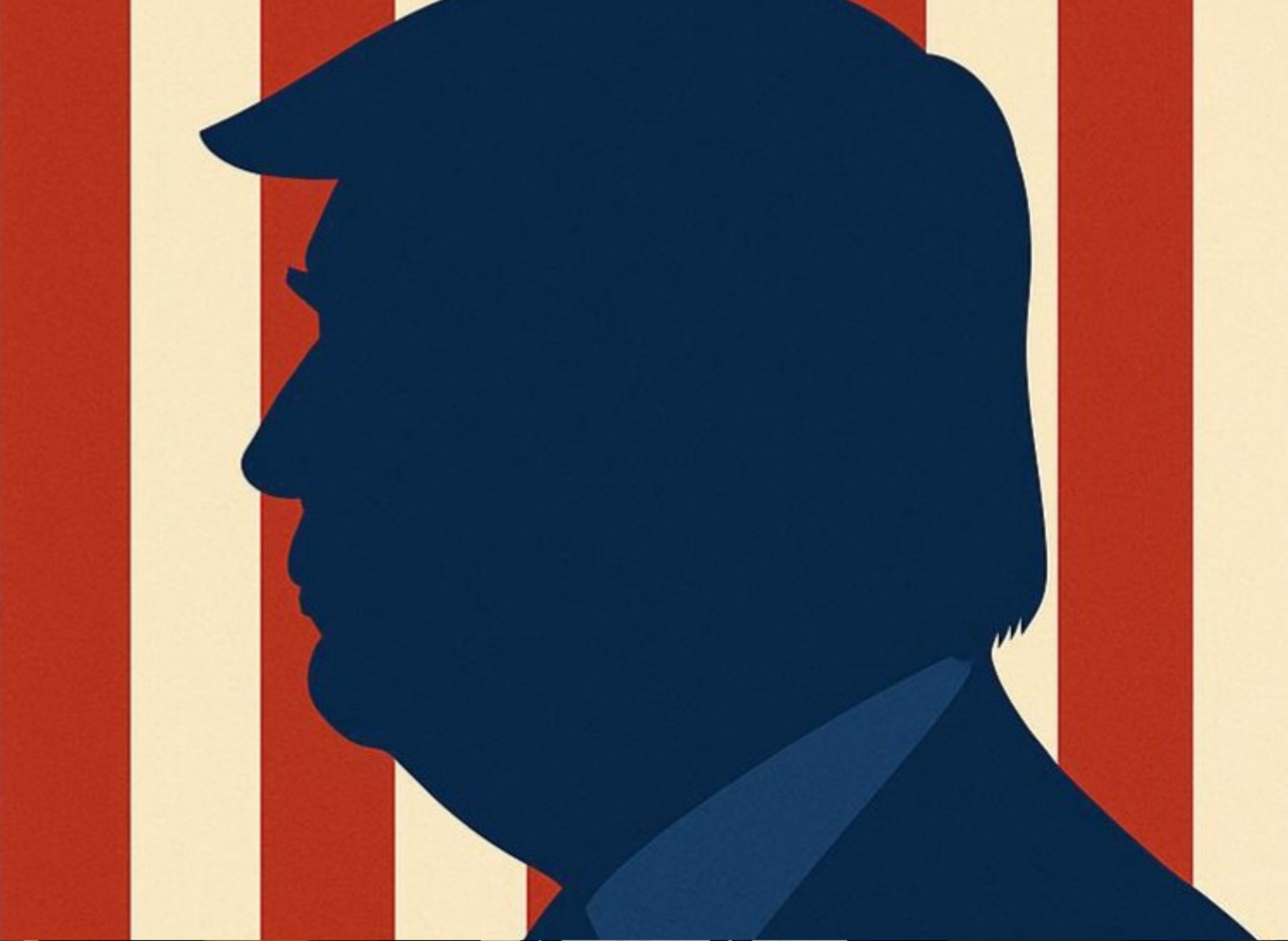
No More Free Rides in a Transactional World
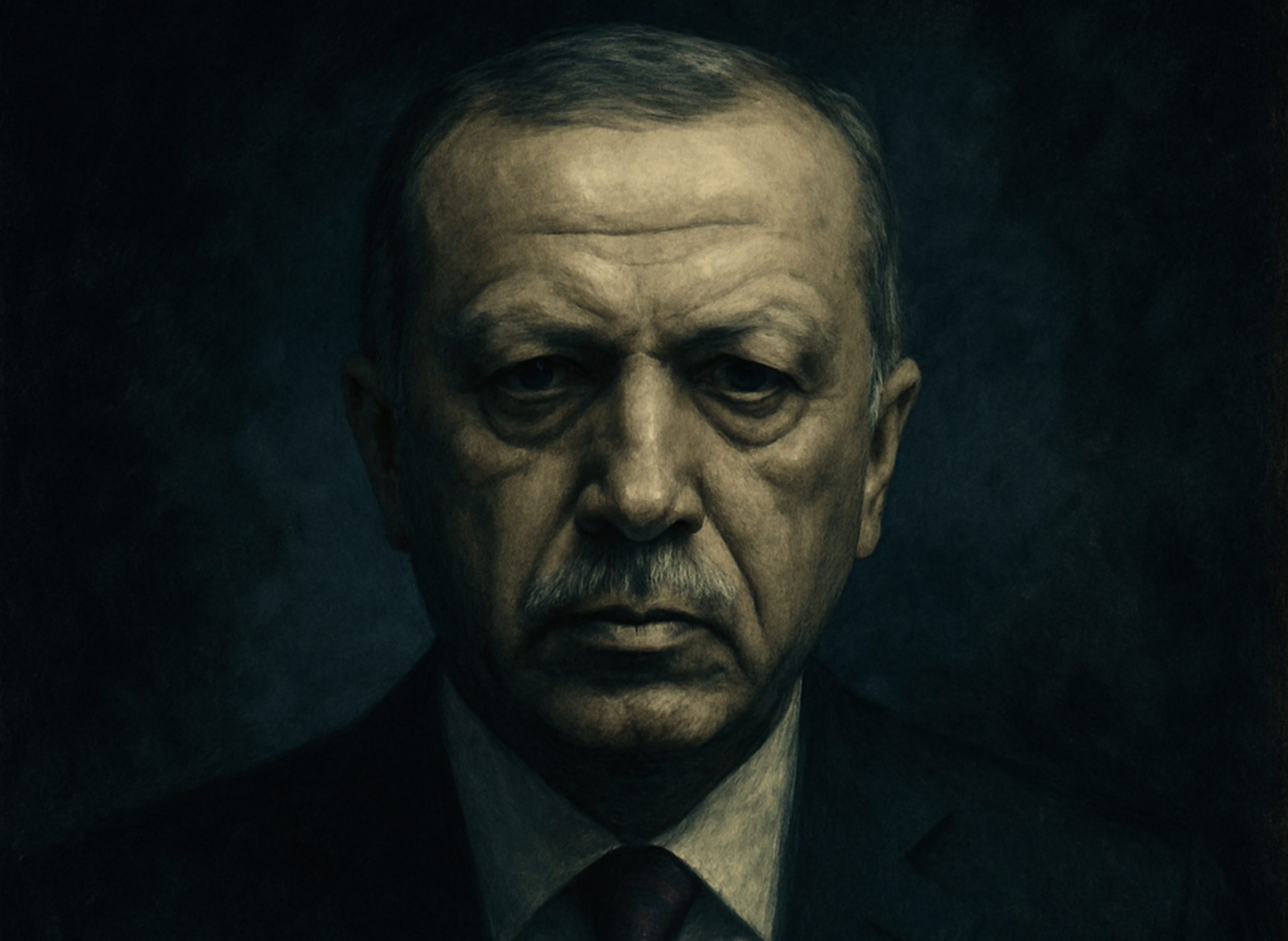
From Democratic Promise to Authoritarian Reality
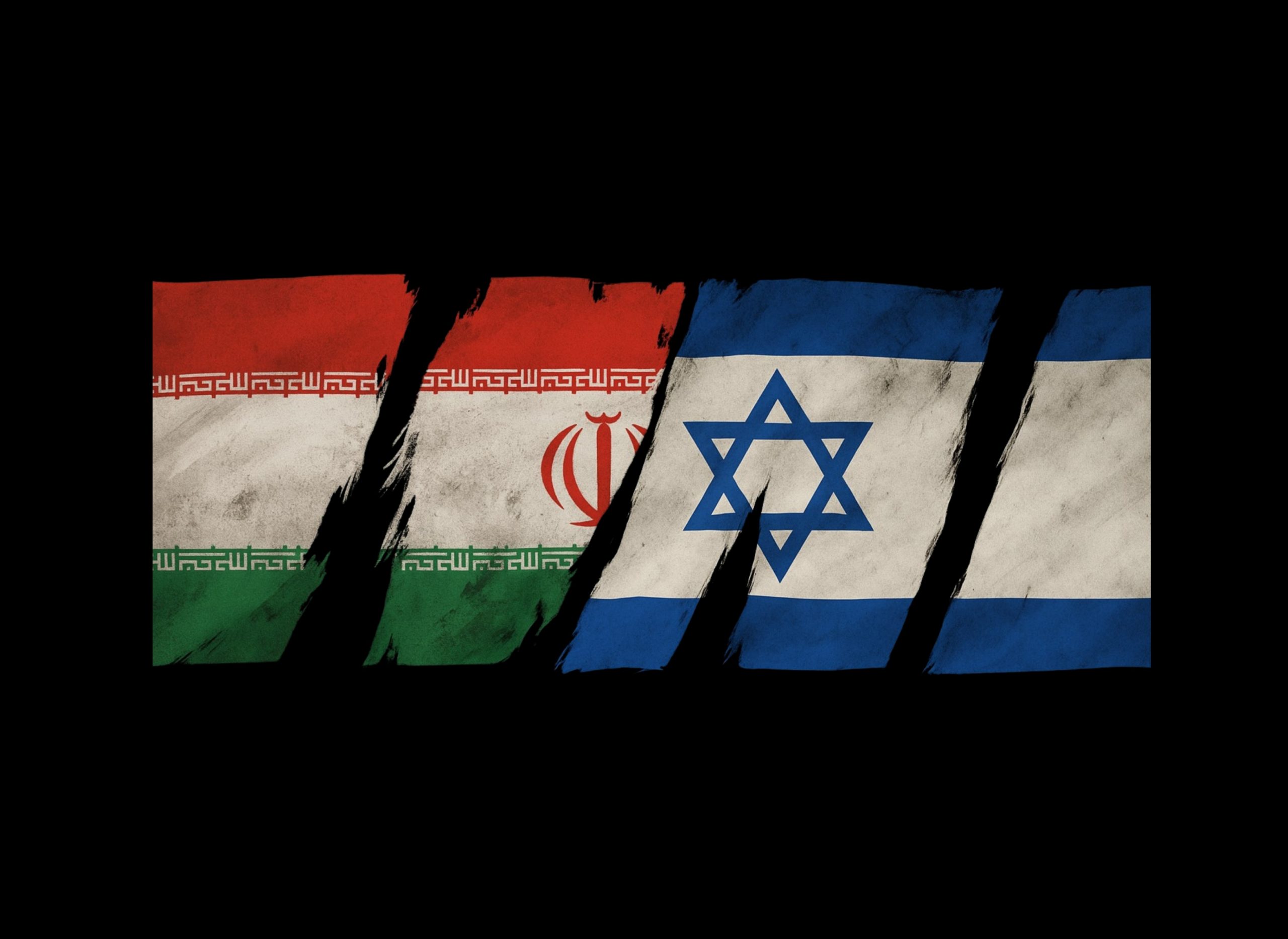
How Two Adversaries Legitimize Power Through Endless Confrontation?
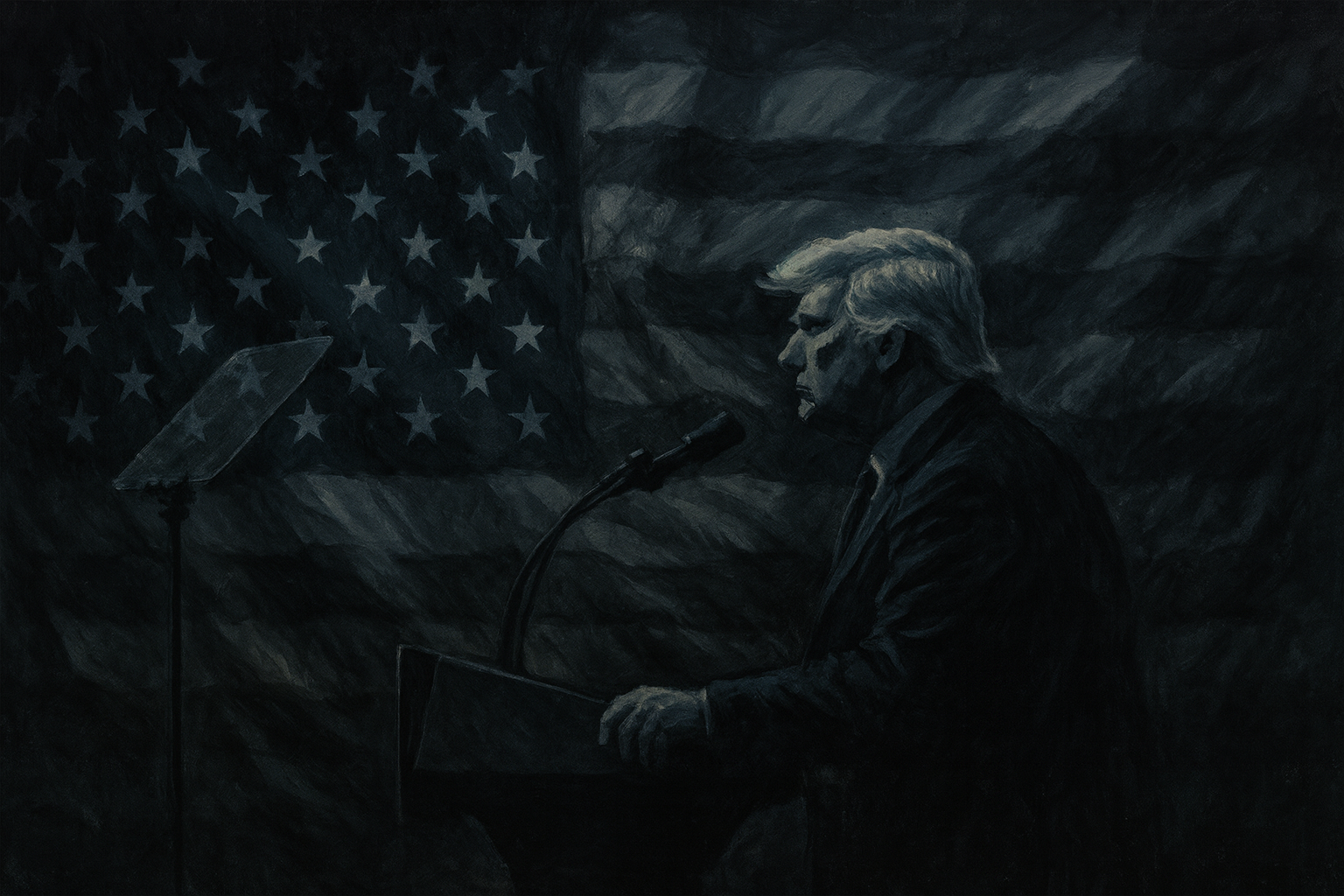
Trump’s War on Norms
